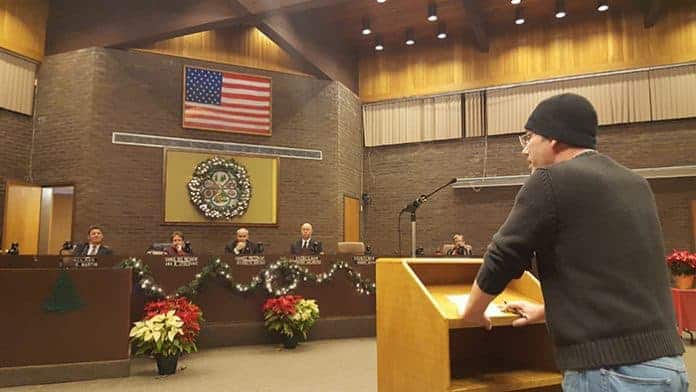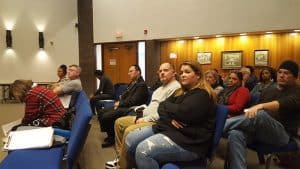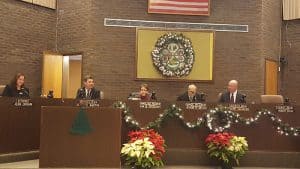
JACKSON – As part of 90-day interim settlement approved during a Dec. 13 council meeting, Orthodox Jewish residents of the township may now be able to erect a religious device known as an eruv.
The settlement comes following a lawsuit filed by Agudath Israel of America concerning ordinance modification approved in September that prohibited the placement of the eruv.
Close to 300 Orthodox Jewish residents came out to a Sept. 12 council meeting to object to the modification of an ordinance introduced on Aug. 22, just weeks after the Jackson Eruv Association presented a plan to erect the eruv.

A letter dated Aug. 8, 2017 from the Jackson Eruv Association to the council, signed by association president Mordechai Burnstein, alerted the council of its plans to work with utility companies to affix eruvin to poles and other utility-owned areas. The eruv can be made of string and tubing and is used in regard to the Jewish observance of the Shabbat, the Saturday holy day. During the Shabbat, no member of that faith is permitted to work. The traditional interpretations of Jewish law forbid moving an object from one domain to another, no matter its weight or purpose. Therefore, the eruv would allow them to do things around their home and still be in observance.
The “interim settlement” is between the township, Agudath Israel of America and WR Property, LLC. It places the lawsuit against the township in stasis as all sides mediate their differences. The lawsuit had been added as an amendment to an existing lawsuit regarding a measure preventing the building of a school in Jackson. The Zoning Board nixed plans for a proposed all girls Oros Bais Yaakov High School, in 2014. The builder of that project was to have been WR Property, LLC. That denial when challenged was upheld in court. That firm owns acreage on White Road in Jackson and under current township law, cannot build a dormitory on that property.
The amendment alleged the township violated the rights of Orthodox Jewish residents by denying their ability to install the eruv. Agudah New Jersey Director Rabbi Avi Schnall has been working with the Jackson Eruv Association on these issues and both groups accused the township of anti-Semitism.
“I look forward to seeing this resolution being approved. As I have stated in the past, our goal has always remained the same, which is to be able to build an eruv for those who need one. We look forward to being able to do so,” Burnstein said just prior to the meeting.
Township Attorney Jean Cipriani explained to a fairly large audience at the most recent meeting that the “three month standstill will allow for Jackson to consult with the plaintiffs calmly and in good faith.”
Cipriani acknowledged that the resolution also recognized the high cost of continued litigation. She put the possible price tag of added legal expenses to Jackson at $5 million. The resolution states that “The Township Council believes that the Settlement Agreement represents the best opportunity for the Township to resolve the claims against it and the Zoning Board of Adjustment and prevent the further expenditure of exorbitant amounts of legal fees.”
Cipriani responded to a question by resident Sheldon Hofstein who asked for clarification of the agreement regarding eruv placement, saying “this will not change the right of way ordinances but grants municipal consent, so people can go to utility companies about the eruv placement.” The attorney also noted that the municipal consent covered eruvs only and not items such as decorations.
“Any changes to ordinances has to come back here (before the council) in a public forum,” Cipriani said.
Residents who spoke during the public comment period expressed strong concerns about both subjects connected to the interim agreement and were not in favor of the resolution.
David Macinnes said “in Brooklyn there were issues of the eruv and a rabbi blessed the area and this wasn’t even necessary. I, being a Roman Catholic, is this not against my religious freedom?”
Cipriani recommend that “if you feel your rights are being infringed upon you should consult your own legal counsel.”
“Rabbis can supersede religious law so it would not infringe on others,” Macinnes said. He also cited potential safety concerns for eruv placement and the need for utility work permits required.
“I’m Jewish and it bothers me that every time we have this kind of issue the anti-Semite card is used,” Allan Finkelstein said. “This isn’t a Christian versus Jew issue. There are people in town who are not Christian who feel the same way and are against this.”
Resident Ray Cattonar asked if any discussion had been made with the Jackson Eruv Association or a rabbi prior to the formation of the settlement agreement. “Did George Gilmore talk to anyone about this?”
Cipriani said that to her knowledge Gilmore (who heads the firm who she works for and which represents Jackson Township) did not communicate with any of the plaintiffs involved and that the only discussion prior to the drafting of the resolution was during a meeting she was part of in Hackensack a few weeks ago.

“I lived in Lakewood and the people there were friendly, but we had gang violence that depreciated the value of our homes. I also caught Orthodox Jews cutting my shrubs and I had to put up a fence. I don’t think it is fair. What did we do to deserve this? I’m not a racist person but I don’t want wires around. I want to be left alone. I got pushed out of Lakewood and it is going to happen here. I feel like I might have to move again. We should be heard,” resident Melissa Urso said.
Cipriani said that the issues involved were not completely in the control of the governing body and that they “are before the court.”
Resident Bob Skinner said, “I’m a little upset that 200 families in the township are trying to dictate what we can do here.” Skinner read a description of the definition of racism to the council. “This is racism in its purest form in my opinion. If you cave in on this, our master plan and other rules will be deemed very weak.”
Councilman Barry Calogero voted for the resolution saying “I see no alternative at this time.”
Council Vice President Ann Updegrave and Council President Kenneth Bressi also voted in support of the resolution. Councilman Robert Nixon could not be present for the meeting due to a family commitment but was part of the session through a conference call. He also voted in the affirmative for the resolution.
Councilman Scott Martin did not. “If this was just about the Eruv I would not have a problem with it. It would be using existing infrastructure and added on to wires and would not affect anyone’s life and would not be an eyesore. The problem about the discussions are with the building of schools. I have said before that I do not wish to disturb the beauty of the township.”
Martin added that “I have no issues with education and I don’t run from any issue because I’ll talk with anyone about anything but I have a problem with schools with dormitories. Once you have one it is difficult to say no to others.”
Cipriani said that the discussions with the plaintiffs would include members of their legal counsel and two members of the council. “The discussions are to see if there is common ground,” Cipriani said. She also indicated that if additional time was needed that the 90-day period might be extended.







